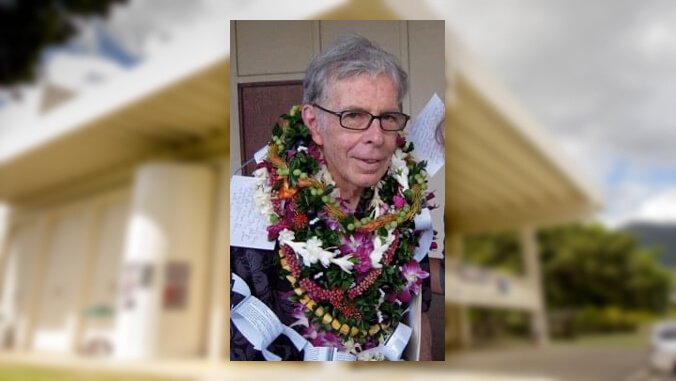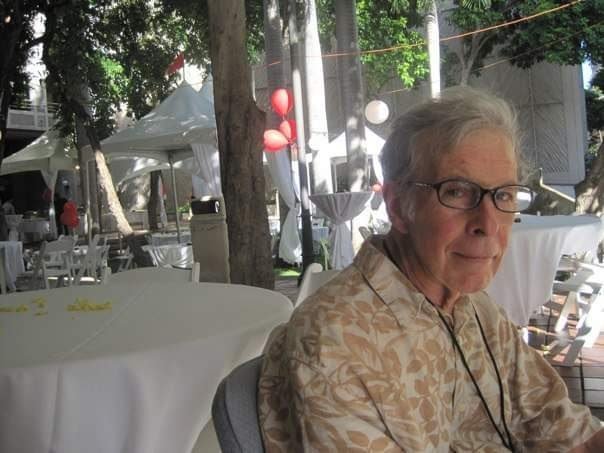Our Friend and Founder
William Dennis Carroll, 81, professor emeritus of the Department of Theatre and Dance at the University of Hawaiʻi, died in Honolulu on November 25, 2021. He was born in Sydney, Australia in 1940. He joined the UH faculty in 1969 and was also active as a playwright and a founding member of Kumu Kahua Theatre. He is survived by his wife, three children and four grandchildren.
Dennis Carroll Memorial Tickets
Kumu Kahua Theatre is proud to honor the memory of our founder, Dennis Carroll, by offering up to 10 free tickets to the community every weekend of every Kumu Kahua Theatre production.
In keeping with a tenet of Carroll's to make theatre accessible to everyone, Dennis Carroll Memorial tickets will be focused on those new to, or financially challenged in, experiencing the performing arts. Alongside the newly unveiled Dennis Carroll Memorial tickets, the nonprofit's Scholarship and Student Tickets will continue to be offered to support future generations of theatre advocates.
An accomplished playwright, professor emeritus of the Department of Theatre and Dance at the University of Hawaiʻi, and founding member of Kumu Kahua, William Dennis Carroll made indelible contributions to the world of Theatre and the Hawaiʻi community.
"While nearly a year has passed since Dennis' death, not a day goes by where his presence isn’t felt in the theatre he championed, on the campus he cherished, or in the hearts of the students he served," says Harry Wong III, Kumu Kahua artistic director and former pupil of Carroll's.
For more information and to inquire about the season tickets named in honor of Dennis Carroll, please call our box office at (808) 536-4441.
Kumu Kahua Theatre Artistic Director Harry Wong Remembers Dennis Carroll
Dennis Carroll has passed from this life. He was my friend, teacher, mentor, collaborator, and colleague. This is from his obituary:
William Dennis Carroll, 81, professor emeritus of the Department of Theatre and Dance at the University of Hawaiʻi, died in Honolulu on November 25, 2021. He was born in Sydney, Australia in 1940. He joined the UH faculty in 1969 and was also active as a playwright and a founding member of Kumu Kahua Theatre. He is survived by his wife, three children and four grandchildren.
It's terse and humble, which I think is what he would want, but does not at all capture his impact on me, or the many people whose lives he touched, or how theatre is practiced at Kumu Kahua—or in Hawaiʻi actually.
My thoughts go out to his family at this time. I also feel I should publicly thank Joe Dodd, retired set design professor at UH Kennedy Theatre and Dance. He was a constant companion to Dennis in retirement, taking him to the movies and out to eat while the rest of us worked to preserve and extend Dennis' legacy.
When I think of Dennis' legacy at Kumu Kahua, I’m reminded of this Emerson quote found in Love's Body by Norman O. Brown, a book he gave me from the shelves in his office when he retired from UH:
But, having made for himself this huge shell, his waters retired; he no longer fills the veins and veinlets; he is shrunk to a drop. He sees, that the structure still fits him, but fits him colossally. Say, rather, once it fitted him, now it corresponds to him from far and on high. He adores timidly his own work.
I have been trying to fill the shell Dennis left at Kumu Kahua since he stopped being active here.
What is that legacy? Here are just a couple quotes from Dennis; I’ll provide context:
"If a director has a blackout in their show, they have failed."
Dennis explained this to me by citing the Soviet filmmaker Sergei Eisenstein. Meaning and emotion is created by the collision between cuts in a film. How scenes collide in a play creates meaning and emotion. "A blackout where stagehands move crap on stage," only takes the audience out of the world of the play.
"Before you can be universal, you have to be local."
Shakespeare wrote for people in the London of his time, as Ibsen or the Greek playwrights wrote for their communities. All these plays that we now think speak to all people for all time were written for a specific community. Here at Kumu Kahua, we are trying to create plays that will last and speak to all people by telling our community's story.
"Other theatres have alcohol at their shows because it's the only way their audiences can make it through their shows."
I used to think this meant plays at Kumu Kahua must be watched with sober deliberation, but after talking to Dennis about it, the quote means that the productions should be the only intoxicant the audience should need.
I have a lot of stories about Dennis. I always tell them by impersonating Dennis in my terrible Australian accent. I’m certain as word spreads, there will be hundreds of remembrances and accolades and stories, most of them on some social media outlet. Here’s a Dennis story for you:
I was waiting in line at the old Marina Theatres in the late 80s going to see The Last Temptation of Christ. Protesters were there yelling at us saying the movie was blasphemous. Along came Dennis and Anu, his daughter. They were coming from the beach. They were carrying towels. He was in swim trunks. He started yelling back at them.
"Have you seen the movie? Then how can you judge the movie?"
They went back and forth for a while. Anu stood there with an expression like, "Yeah, this is what my dad does."
He saw me in line; I was taking my first class from him at UH, playwriting.
"Are you going to watch the movie?"
"Yes," I said.
"Good. Don’t listen to these people!"



